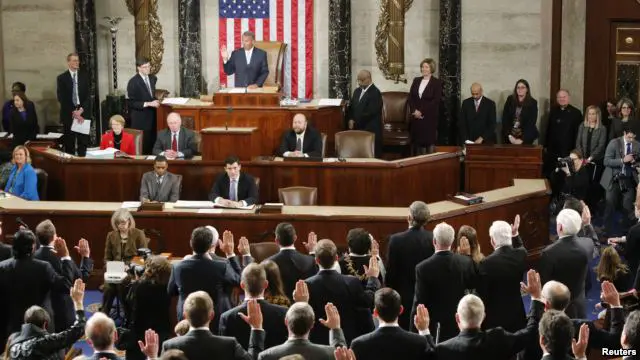South African President Jacob Zuma faces a no-confidence vote by secret ballot in parliament Tuesday, with opponents hoping that discontented ANC lawmakers could help oust him from office.
Criticism of Zuma from within the African National Congress (ANC) has grown over corruption scandals and economic woes, and the celebrated party of Nelson Mandela has declined sharply at the polls.
But the ANC -- which holds a large majority in parliament -- welcomed the decision to hold the vote by secret ballot and said it expected the no-confidence motion to fail.
Several opposition parties will lead a protest to the national assembly in Cape Town on Tuesday ahead of the parliamentary session due to begin at 2:00 pm (1200 GMT).
"ANC MPs now have no excuse. They must use their vote... to remove Jacob Zuma," the main opposition Democratic Alliance party said after the speaker of parliament made a surprise decision Monday to hold the ballot in secret.
Zuma has easily survived several previous parliamentary votes held without secret balloting.
A 201-vote majority would be needed to remove him from power, and the ANC holds 249 seats in the 400-seat parliament. His cabinet would also be forced to resign.
"It's a long shot to expect a significant number of ANC MPs to vote against their own party and let the opposition claim this big political scalp," independent analyst Daniel Silke told AFP.
Zuma, 75, is due to step down as head of the ANC in December, and as president before the 2019 general election -- lessening pressure for his party to trigger imminent change.
ANC loses its lustre
The secret ballot has been subject to a long legal battle waged by opposition parties, who hope that ANC lawmakers will now be emboldened to vote against him without fear of intimidation.
Last week ANC chief whip Jackson Mthembu acknowledged recent criticism of the party, including the impact of a cabinet reshuffle in March when respected finance minister Pravin Gordhan was replaced with a Zuma loyalist.
Gordhan's sacking led to a string of downgrades to South Africa's credit rating as well as causing the rand currency to tumble.
Public support for the ANC, which swept to power under Mandela in the first non-racial elections in 1994, slipped to 55 percent in last year's local polls -- its worst-ever result.
A handful of MPs, including Gordhan, have joined calls from anti-apartheid veterans and trade unions for Zuma to resign, as South Africa endures record unemployment and a recession.
Zuma has been engulfed by corruption allegations since coming to office in 2009.
A court last year found him guilty of violating the constitution after he refused to repay taxpayers' money used to refurbish his private rural house.
He has been accused of being in the sway of the wealthy Gupta business family, allegedly granting them influence over government appointments, contracts and state-owned businesses.
He is also fighting a court order that could reinstate almost 800 corruption charges against him over a multi-billion dollar arms deal in the 1990s.
Zuma is seen as favouring his ex-wife, former African Union chief Nkosazana Dlamini-Zuma, to succeed him ahead of Deputy President Cyril Ramaphosa.
(AFP)
 简体中文
简体中文







